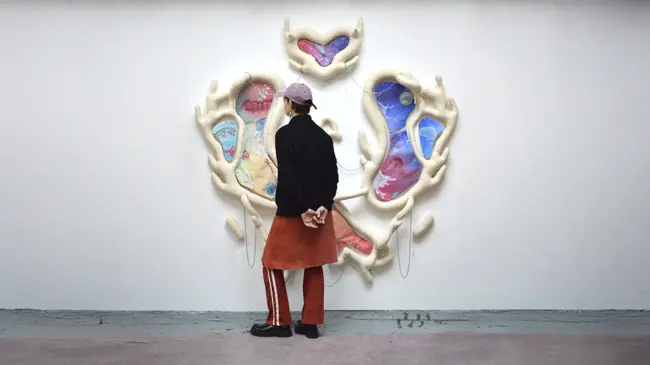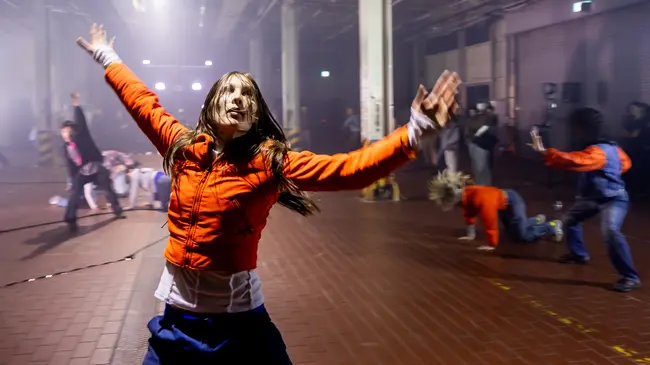Sirien Salameh

Different Class's goal is to provide young artists with the space to freely express themselves. Our commitment lies in amplifying their voices and what they stand for. Despite our will to remove ourselves from the equation when it comes to our artists’ voices, we cannot accept neutrality or take distance from the question of systematic colonial oppression. As a cultural platform, we remind our audience – whether you are an artist, a creative, or just a spectator – of the power that words hold.
We asked several creatives to share their thoughts on art, resistance and freedom. Illustrator, Sirien Salameh, painter, Ismail Mattar, artist, Firas El Hallak, musician Shadi Zaqtan, poet and co-founder of Palettes of Palestine, Hala El Mohor, photographer, Abdulazez Dukhan and art collective Tashattot - each shared their unique forms of expression regarding Palestinian freedom.
For you, what does it mean to be free?
I feel like it could mean a lot of different things, but this is what free means to me:
Freedom of speech, to be able to talk about what you want, like say the name of your country without being prosecuted.
Freedom of movement, to go where you want without restrictions, like visiting the beach or the next town in your own country without being denied access.
Freedom to think about what you want and being able to articulate it openly.
Freedom in doing, making and creating.
Can you tell us about your work? What led you to printmaking and illustration?
I have always been drawn to stories and images, I knew I wanted to spend most of my time making illustrations. I studied storytelling at Luca school of Arts, where I learned a lot about combining the narrative and visual aspects, and how to tell a story using one or many images.
During that time, I experimented a lot with different materials, trying to find a medium that worked for me and for my stories. I noticed during that time that I like to tell stories that are close to me or about the things I’ve lived. I like to convey the feeling that I experience when thinking about those memories and experiences through colour and different techniques to try and illustrate it in an accurate way.
<img class="editorial-image" src="https://cdn.prod.website-files.com/61eebcc683107b99137f4423/657055c981fb745929e7dee2_differentclassEating%20knafeh(favoH).webp"/>
Your cookbook ‘Where the Olive Tree Stands’ uses your own memories to tell a story about tradition, loss, olive trees and occupation. Can you tell us more about it?
I grew up filling my tiny pockets with small pebble stones from peoples driveways, while walking to the bus station, telling my parents I would use them in the future against the people stealing our land.
I grew up with the news always being on TV–talking about Palestine and showing the genocide happening live in the land that could have been my home.
I grew up with the stories of my Palestinian family, how they had to leave their land and belongings to travel to a new place where they were expected to continue their lives as if nothing happened.
I grew up telling people I am Palestinian and them not knowing where it is situated on a map.
‘Where the Olive Tree Stands’ is a Palestinian cookbook.
I wanted for people to get to know Palestinian dishes, using the family recipes that I have been lucky to be eating my entire life. At the same time, highlight the fact that those dishes, recipes and ingredients are being colonised in the same way that the Palestinian land is being seized and olive trees are being uprooted; how our culture, food and traditions are being stolen.
Throughout the recipes seeps a story about the daily struggles of many Palestinians.
What concrete ways can the art and cultural sector effectively help with the current situation?
By making art about things that are happening in the world right now, making people curious about subjects, things they may know nothing about. The cultural sector gives a platform to artists and creatives, a way for them to spread a message or idea to a larger group of people.
As an artist living in Europe, Do you think your audience and environment understand your work, and deal with it the way you intended? And does the meaning of your work change according to where it is being consumed?
When making my cookbook, a lot of the drawings were familiar to a lot of my Palestinian friends and especially my family, they recognised things because they had similar experiences. It brought out emotions in them that I might not get from other people or maybe not in the same way. People will always try to interpret artwork in their own way, using the knowledge they have. So I would say it depends from person to person. I try to stay as concrete as I possibly can and not let the ‘fear’ of people not understanding change the way I want to create something.
I think being a Palestinian born and raised in Belgium, It is natural for me to make work in Dutch, it is my language of choice at the moment. But at the same time, that creates a barrier between my work and the people whom the work is about, especially my family that doesn’t speak Dutch well or even at all. For them I need to make sure the pictures capture what the text is saying in some way or another. I think that is something that I find important.
An artwork, poem, music, or photo you want us to look at/learn more about today?
A poem by Mahmoud Darwish- The second olive tree from the book: A River Dies of Thirst
This is one of my favourite poems, I read it a lot during times where I felt a bit stuck during the making of my book.
<img class="editorial-image-50-left" src="https://cdn.prod.website-files.com/61eebcc683107b99137f4423/657055cbc1084fd6ef4d75ca_differentclassthe%20second%20olive%20tree%201.webp"/>
<img class="editorial-image-50-right" src="https://cdn.prod.website-files.com/61eebcc683107b99137f4423/657055c9004ba1048b16038a_differentclassthe%20second%20olive%20tree%202.jpg"/>
<div class="editorial-banner"> <div class=“editorial-credits”> @sirieeen <br/> Donate now to Medical Aid Palestine or to the Palestine children's relief fund to address urgent humanitarian needs in Palestine. Or learn more at Decolonize Palestine. </div></div>
Different Class works with the interest of their community at heart.
Our work’s purpose is to foster a solid network for independent artists, those who love them, and those who want to support them. Become a member to contribute to the local Belgian art scene.






